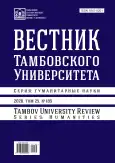Stages of teaching Master’s Degree Students written academic discourse with group blog using
- Authors: Dronov I.S.1
-
Affiliations:
- Derzhavin Tambov State University
- Issue: Vol 25, No 185 (2020)
- Pages: 19-28
- Section: THEORY AND METHODS OF FOREIGN LANGUAGE TEACHING
- URL: https://bakhtiniada.ru/1810-0201/article/view/298596
- DOI: https://doi.org/10.20310/1810-0201-2020-25-185-19-28
- ID: 298596
Cite item
Full Text
Abstract
We develop and present stages of teaching Master’s Degree Students written academic discourse with group blog using. As part of the research was made an analysis of the existing stages of foreign language teaching, including blog technology using. The result of scientific works analysis is the development of stages of teaching Master’s Degree Students written academic discourse with group blog using. This stages includes the following steps and the corresponding stages: 1) introductory stage (Step 1 – The process of introducing project activities in the context of using the study group blog is carried out – description of the project, setting goals, defining tasks, and deadlines); 2) technical stage (Step 2 – Registration on one of the Internet platform related to blog technology and its subspecies – the blog of the study group; Step 3 – Discussion of information security on the Internet when working with the study group blog); 3) educational and training stage (Step 4 – Explanation of the structure of writing a specific scientific document (theoretical and practical aspect); Step 5 – Testing the theoretical component of the structure of writing a specific scientific document; Step 6 – Testing a practical component of writing a specific scientific document); 4) presentation stage (Step 7 – Finding information on a given topic of the project and its further use in fulfilling the task; Step 8 – Publishing material on the study group blog; Step 9 – Acquaintance and assessment materials published by other students with their subsequent commenting; Step 10 – Re-publication of the material taking into account the correction and error correction or publication of responses to comments of other users); 5) Final stage (Step 11 – Evaluation of the work done by students with subsequent reflection and identification of strengths and weaknesses at work, as well as identification of recommendations for further improvement; Step 12 – Evaluation of the work done by the teacher based on the indicated criteria).
About the authors
I. S. Dronov
Derzhavin Tambov State University
Author for correspondence.
Email: ivandronovtsu@mail.ru
ORCID iD: 0000-0002-1685-4313
Assistant of the Linguistics and Humanitarian and Pedagogical Education Department
33 Internatsionalnaya St., Tambov 392000, Russian FederationReferences
- Dewey J. Democracy and Education: An Introduction to the Philosophy of Education. New York, Macmillan Publ., 1916, 223 p.
- Kilpatrick W.H. Osnovy metoda [Bases of Method]. Moscow, Leningrad, Gosizdat Publ., 1928, 115 p. (In Rus-sian).
- Zimnyaya I.A. Klyuchevyye kompetentsii – novaya paradigma rezul’tata obrazovaniya [Key competencies – a new paradigm of educational outcomes]. Vyssheye obrazovaniye segodnya – Higher Education Today, 2003, no. 5, pp. 34-42. (In Russian).
- Shatskiy S.T. Pedagogicheskiye sochineniya: v 4 t. [Pedagogical Essays: in 4 vols.]. Moscow, Prosveshcheniye Publ., 1962–1965, vol. 2, 475 p. (In Russian).
- Holm M. Project-based instruction: a review of the literature on effectiveness in prekindergarten through 12th grade classrooms. InSight: Rivier Academic Journal, 2011, vol. 7, no. 2, pp. 1-13.
- Markham T., Larmer J., Ravitz J. Project-Based Learning Handbook: A Guide to Standards-Focused Project-Based Learning for Middle and High School Teachers. Novato, 2003, 179 p.
- Fried-Booth D.L. Project Work. Resource Books for Teachers. Oxford, Oxford University Press, 2002. 136 p.
- Gromyko Y.V. Proyektnoye soznaniye [Project Mind]. Moscow, Institut uchenika Paydeya Publ., 1998, 551 p. (In Russian).
- Anufriyeva S.R. Ispol’zovaniye komp’yutera pri sozdanii proyektov [Using a computer when creating projects]. Nachal’naya shkola – Elementary School, 2010, no. 7, pp. 53-55. (In Russian).
- Lazarev V.S. Novoye ponimaniye metoda proyektov v obrazovanii [A new understanding of the project method in education]. Problemy sovremennogo obrazovaniya – Problems of Modern Education, 2011, no. 6, pp. 35-43. (In Russian).
- Polat E.S. Metod proyektov na urokakh inostrannogo yazyka [Method of projects in foreign language lessons]. Inostrannyye yazyki v shkole – Foreign Languages for Schools, 2000, no. 3, pp. 3-9. (In Russian).
- Rozanov L.L. Shkol’nyy geoekologicheskiy proyekt: rekomendatsii po vypolneniyu [School geoecological project: recommendations for implementation]. Geografiya v shkole – Geography in School, 2004, no. 7, pp. 39-42. (In Russian).
- Pakhomova N.Y. Metod uchebnogo proyekta v obrazovatel’nom uchrezhdenii [Educational Project Method in an Educational Institution]. Moscow, ARKTI Publ., 2003, 112 p. (In Russian).
- Pavelyeva T.Y. Razvitiye umeniy pis’mennoy rechi studentov sredstvami uchebnogo internet-bloga (angliyskiy yazyk, yazykovoy vuz): avtoref. dis. … kand. ped. nauk [The Development of Writing Skills of Students by Means of an Educational Internet Blog (English Language, Linguistic University). Cand. ped. sci. diss. abstr.]. Tambov, 2010, 21 p. (In Russian).
- Ilina E.A. Metodika razvitiya umeniy pis’mennoy rechi uchashchikhsya na osnove internet-tekhnologiy: an-gliyskiy yazyk, srednyaya shkola: avtoref. dis. … kand. ped. nauk [Methods for Developing Students’ Writing Skills Based on Internet Technologies: English Language, Middle School. Cand. ped. sci. diss. abstr.]. Tambov, 2013, 27 p. (In Russian).
- Cherkasov A.K. Metodika razvitiya sotsiokul’turnykh umeniy studentov posredstvom veb-foruma: angliyskiy yazyk, yazykovoy vuz: avtoref. dis. … kand. ped. nauk [Methods for the Development of Social and Cultural Skills of Students Through a Web Forum: English Language, Linguistic University. Cand. ped. sci. diss. abstr.]. Moscow, 2012, 22 p. (In Russian).
- Safonova V.V., Sysoyev P.V. Angliyskiy yazyk. Elektivnyye kursy. Kul’turovedeniye Velikobritanii. Kul’turovedeniye SSHA [English Language. Elective Courses. Cultural Studies of Great Britain. Cultural Studies of U.S.A]. Moscow, AST, Astrel, Khranitel Publ., 2007. (In Russian).
- Sysoyev P.V. Sovremennyye informatsionnyye i kommunikatsionnyye tekhnologii: didakticheskiye svoystva i funktsii [Modern information and communication technologies: didactic characteristics and functions]. Yazyk i kul’tura – Language and Culture, 2012, no. 1 (17), pp. 120-133. (In Russian).
Supplementary files








